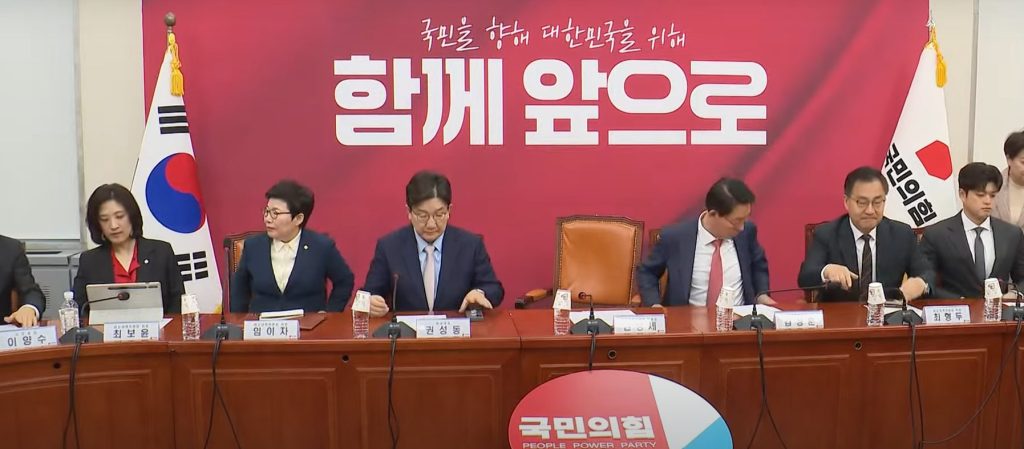The South Korean Political Landscape and its Crypto Future
As South Korea gears up for its pivotal presidential election on June 3, the political battleground is heating up, with cryptocurrency policy emerging as a defining issue. The People Power Party (PPP) is ready to shake things up, pledging to scrap a contentious banking law that currently hampers the country’s crypto exchange operations. This significant move could reshape the industry and attract a fresh wave of investment in digital assets.

Understanding the Controversial Crypto Banking Law
The existing law mandates that South Korean banks engage in exclusive partnerships with domestic cryptocurrency exchanges. This arrangement puts an overwhelming burden of risk on banks, making them reluctant to support smaller players in the crypto market. As a result, only a handful of exchanges have successfully secured partnerships, limiting their ability to offer crypto-fiat trading options to clients. Smaller exchanges have been particularly hard hit, with many having to shut down operations entirely or pivot to solely facilitating crypto-to-crypto trades.
According to the PPP, abolishing this law is just one of seven transformational policies aimed at reviving the cryptocurrency ecosystem in South Korea. During a recent summit at the National Assembly, PPP lawmaker Park Soo-min emphasized the need for more freedom in crypto trading. He argued, “The current regulations create monopolies that restrict citizen access to cryptocurrencies. Our new approach will democratize the market and foster competition amongst exchanges.”
Seven Key Proposals for Crypto Progress
The PPP’s ambitious manifesto introduces pivotal policy changes intended to invigorate the domestic crypto landscape:
- Launch of Corporate Crypto Trading: Set to roll out by the end of 2025.
- Establishment of a Virtual Asset Special Committee: This body will report directly to the President, amplifying the focus on blockchain technology.
- Approval of Crypto Spot ETF Trading: Aiming for implementation within the year 2025.
- Legislation on Security Token Offerings (STOs): Promoting innovative fundraising methods.
- Global-Standard Stablecoin Regulation: Aiming for international competitiveness and financial security.
- Increase Transparency in Crypto Taxation: Providing much-needed clarity to investors.
These plans reflect the PPP’s overarching goal – to inspire innovation within the sector and regain the trust of weary investors seeking stability.
Why This Matters: The Significance of Crypto Reformation
The cryptocurrency sector is not just about technology; it encapsulates the aspirations of a new generation of investors and innovators. As regulations tighten globally, creating an open and robust crypto environment in South Korea could position the country as a leader in the digital asset space. Striking a balance between regulation and innovation is essential to maintaining both competitiveness and consumer safety. With the future of crypto policy in a fragile state, the upcoming election could significantly influence South Korea’s position in the global market.
Expert Insights: Perspectives on the Shift
Crypto analysts and enthusiasts are watching closely as the PPP rallies support for its proposals. The push to deregulate is expected to not only appeal to existing crypto aficionados but also attract new investors. With the looming election approaching, experts suggest that both major parties are courting younger voters who are increasingly interested in cryptocurrencies. The PPP’s proactive stance on crypto could resonate deeply, guiding the conversation about the future of digital assets in South Korea.
Election Countdown: Who Will Win the Crypto Battle?
As South Korea prepares for its upcoming election, current polling positions the PPP significantly behind its rival, the Democratic Party (DP), led by Lee Jae-myung. With the DP commanding nearly 47% compared to the PPP’s 35%, the race is still very competitive. The PPP needs to solidify its appeal to younger voters—especially those passionate about cryptocurrency—if it hopes to overturn the current disadvantage.

The Path Ahead: What’s Next for Crypto in South Korea?
Both major parties express a desire to reform crypto regulations. The PPP’s candidate, once chosen, will need to clarify their stance and implement effective strategies to back their pledges—a tall order given past inadequacies. In past elections, promises to innovate and deregulate were abundant, yet many went unfulfilled. Will the future leader of South Korea rise to the occasion and reshape the crypto environment for the better? As the election approaches, the tension is palpable, and the potential for change could resonate throughout the entire sector.
As we await the results, the question on everyone’s mind is clear: Who will emerge victorious in the race to champion cryptocurrency, and what will that mean for the future of digital assets in South Korea? We welcome your thoughts and insights in the comments below!

